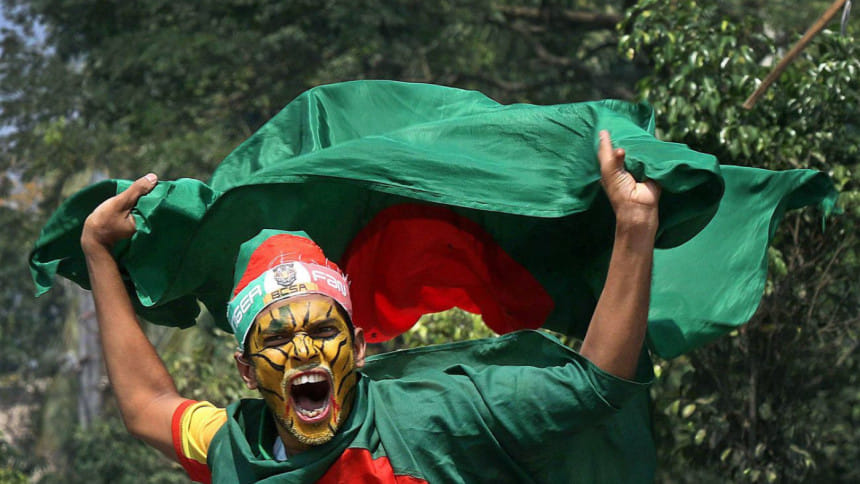Paucity of purpose

THE people of Bangladesh do not take any insults hurled at them lightly. They also secretly join their palms in prayers and hope that whoever opposes them will someday be proven wrong. Yes, we are an unforgiving nation when it comes to our national integrity. We may have thousands of disputes to settle amongst our political parties or ideologies, but as far as the sustainability of sovereignty goes, there is not one Bangali who will compromise on the question of statehood…unless the opposing forces are outright Razakars.
When Bangladesh won and made it to the quarterfinals, a Pakistani cricketer, who later claimed that his twitter account was hacked, had sarcastically commented that we were celebrating as if it were a victory like 1971, many from Bangladesh pushed his twitter to the limit and bombarded him with counter responses, which were obviously not kind in nature. Similarly, the two controversial umpiring decisions during Bangladesh's quarterfinal game against India in Melbourne did not go down well with the people of this land. While umpire Ian Gould no-balled Rubel in the 40th over of the match, the whole of Bangladesh watched Bangladesh losing to India by 109 runs. While, like all other sports, cricketers nurture their sportsman spirit, millions of Bangladeshis at home and abroad could not but shed tears. In social media, the comments by Rupom, the Indian singer, was also not taken well by many of us. So when India did not make it to the finals, many die-hard Indian supporters in Bangladesh also had little to grieve over…just because as a nation, we stand united when it comes to self-esteem.
Right after Rana Plaza, the brand American Apparel put up an ad with the picture of an almost nude model-cum-employee of the company. The ad read: "Made in Bangladesh," and the tag line ran through the upper half of the girl, Maks -- a merchandiser who worked in the brand's office. The father of the girl is from Bangladesh. The ad enraged most of the manufacturers in Bangladesh and we were hurt. But a couple of days ago, when the news that the struggling retailer, which has faced many controversies, had announced that its sales fell to $153.5 million, down 9.2% from $169.1 million in the year-earlier period and that in the three months which ended December 31, its loss was 19 cents a share, compared to the same period a year earlier, not many of us were surprised, shocked or sad.
Bangladesh is a young and a proud nation and with the demographic dividend on its side, it's time to turn it around. If at all any of us want to change things in this land, which way do we go? Is blockade, hartals and an endless phase of protests the real answer to a crisis? One could cite an endless list of the mistakes of the incumbent and complain about the limitations in our democratic practices in the country, but one also ought to question whether, on the 90th day today, a continuous agenda makes sense and, in the end, who does this agenda benefit but a handful of party loyalists? Truth is, no revolt or protest in the last three years has pole-shifted our lives from what it used to be to a life as we know it today.
What does a real revolution look like, really? A couple of references to a few 'people-led' protests may clear the air. For example, the anti-corruption movement which was carried out in the Ramila Maidan in India for almost 40 days, led by many influential leaders among which Anna Hazare and Baba Ramdev supporters stood out the most, had over a 100 million protesters directly linked to it. The Chilean Winter protest carried out in August in 2011 was literally sustained by a series of student-led demonstrations across Chile, who had demanded a new framework for education and an end to the existing profit-motive in higher education. Colombian students also revolted in 2011 and as a result of the protests, a government-planned reform was withdrawn from the parliament on the November 16, 2011. The people of Afghanistan have been protesting against the War in Afghanistan from 2001 till date. In the Arab World, many have become the children of the Arab Spring and have continued with on-going protests and violent and non-violent riots, directing their protest against their respective governments and existing systems, ever since 2010. In Turkey, in May 2013, the common people launched a series of protests and demonstrations against the clampdown on freedom of the press, freedom of expression, freedom of assembly, and the government's encroachment on the country's secularism. The Movemento Pasee Livre (Free Fare Movement), a local organisation advocating for free public transportation, gave birth to mass protests in Brazil in 2013, and the Occupy Movement with a "We are the 99%" tag went global with a cause and recently reached as far as Hong Kong. In reality, none of these protests would have happened had there had been no people in the picture.
In the recent spate of protests staged by a major political party in Bangladesh, where are the people? There may be a hundred allegations against the government, there may be accusations of oppressing political opponents, there may be a thousand and one arguments against the incumbent of being autocratic, but does continuing a 90-day long protest, without the support of the people justify any purpose? Very often, many politicians tend to forget that it's only the votes that bring them to power and that this land in general is intolerant about violating democracy. To many in Bangladesh, democracy is not only about a single fair election, but it is always about the continuing democratic practices of the incumbent and the democratic tolerance of the opposition.
The writer is Managing Director, Mohammadi Group.

 For all latest news, follow The Daily Star's Google News channel.
For all latest news, follow The Daily Star's Google News channel. 



Comments